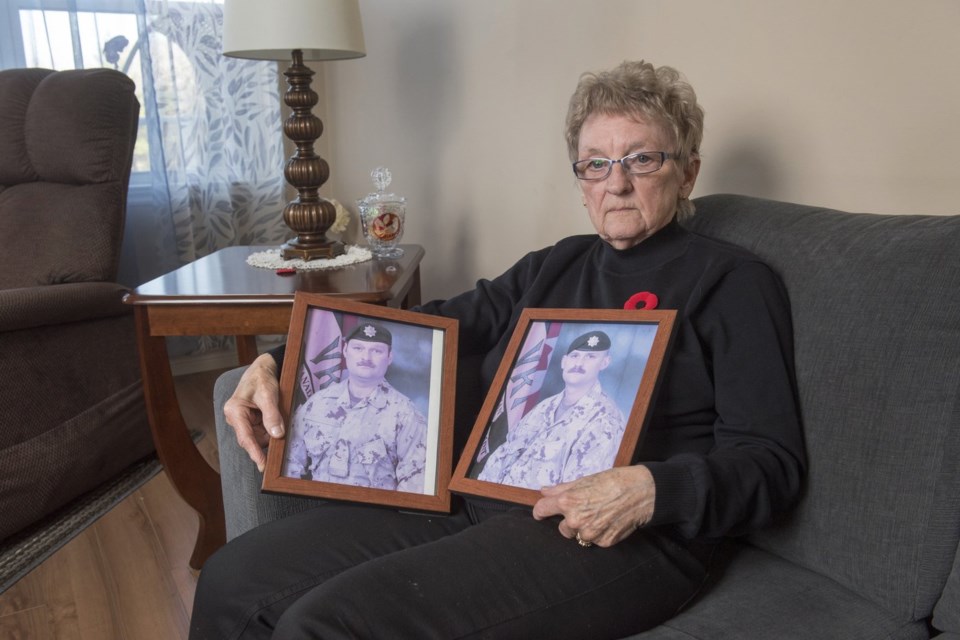Maureen Anderson lost both her sons to their overseas service in the Canadian Army, even if they died years later and a continent away from the hot dust and violence of the Afghanistan war.
Growing up, Ron Anderson was more serious, “a little fighter,” his mother recalls. His younger brother Ryan was quieter, softer. Both joined the military before they finished high school, already certain of what their career paths would be.
“My boys were very kind to me, and I miss them terribly,” Anderson said in an interview this week from her home in Oromocto, N.B.
Sgt. Ron Anderson, a father of four, died by suicide in 2014 at the age of 39. Ryan, also a sergeant and a father of two, died in 2017 at 38. Anderson doesn’t like to discuss specifics of how they died, but she attributes both deaths to the post-traumatic stress disorder they suffered as a result of their extensive overseas military service, including in Afghanistan.
Anderson, 78, will be travelling to Ottawa to lay a wreath at the national Remembrance Day ceremony on Nov. 11 as this year's national Silver Cross Mother. The silver cross, also known as the memorial cross, is awarded to mothers or widows of Canadian soldiers who died on active duty or as a result of it.
Anderson said its “a little overwhelming,” but that she is honoured to have been picked by the Royal Canadian Legion.
Despite having lost her only two children, she says she has never wished they opted for different careers. In some ways, a military life seemed almost inevitable for both of them.
Anderson herself is the daughter of a Canadian Second World War veteran. Her late husband, Peter, was a soldier, serving with the Regiment of Canadian Guards on Parliament Hill and then the Royal Canadian Regiment. Maureen herself served briefly with the Air Force as a nurse in Ottawa.
She said Ron decided early on to follow in his father’s footsteps.
“That was his life and he loved it,” she said, adding Ryan wasn’t far behind.
Ron became a valued Army member, serving in Croatia, Bosnia and Kosovo before completing two tours of duty in Afghanistan. But after coming home from his second stint there in 2007, his mother said, he changed – becoming distant and short-tempered. “He just wasn’t the same," she said.
After Ron died, she learned he had received an award in Fredericton after jumping out of a vehicle to administer first aid to a young boy on a roadside in Afghanistan, despite danger around him. Not wanting to be fussed over, Ron never told anyone. “That was his way, but we were devastated when we got the certificate, thinking we could have been there," Anderson said.
Ryan, she said, started to go “really downhill” after his brother’s death. His marriage suffered and he became isolated, sad and withdrawn. He had served in Afghanistan alongside his brother, as well as on several other overseas deployments, including in Bosnia, Ethiopia and Haiti.
A July 2007 article from Afghanistan in the National Post detailed the dangers the brothers faced when a string of bombs struck their convoy as it headed to Kandahar province to lend support to Afghan police.
Don Martin's article described Ron Anderson witnessing a suicide bomber detonate and Ryan riding in a vehicle that hit an improvised explosive device, all only days after six of their fellow Canadian soldiers were killed by a roadside bomb.
Since her sons’ diagnoses, Anderson has publicly called for better treatment for veterans with PTSD. She questions whether Ryan was on too many medications, and wonders if veterans might need more talk, check-ins and specialist doctors. In the end, though, she doesn’t have the answers.
“I don't know how much they're doing for the soldiers,” she said. “I really don't know, but maybe they're not doing enough.”
She does feel that more people are willing to talk openly about PTSD than in the past, and hopes to use her time as Silver Cross Mother to ensure that keeps happening.
Anderson, who is retired, says she keeps her sons’ memories alive by looking daily at their photos and remembering the good times. She also has six grandchildren, including one of Ron’s sons who has joined the military, and several great-grandchildren.
She keeps herself busy seeing friends and volunteering in her community, including helping with the annual Remembrance Day poppy campaign. And while her prominent position in this year’s national Nov. 11 commemoration ceremony will be something new, she says she's always attended local Remembrance Day events, no matter where her family was stationed.
“I never missed one, whether it was rain, sleet, snow or whatever,” she said. “So that was just part of Nov. 11th for me, always.”
This report by The Canadian Press was first published Nov. 1, 2024.
Morgan Lowrie, The Canadian Press




